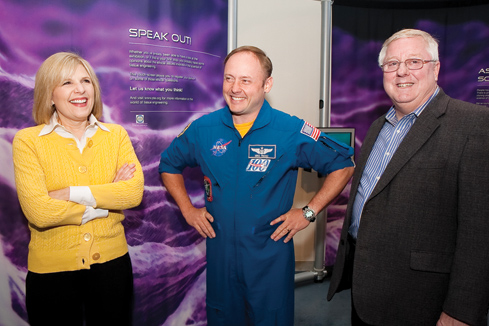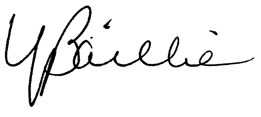 Summer 2011
Summer 2011|
"Dreams, we know, start with inspiration—and we dole out bushels of it at the Science Center every day."
|
 Ann Metzger and Ron Baillie with big dreamer Mike Fincke.
"The future belongs to those who believe in the beauty of their dreams.” This quotation by Eleanor Roosevelt came to mind recently when we were discussing Mike Fincke, our hometown astronaut from just down the Ohio River in Emsworth, Pa. Mike’s dream was to fly in space. Mike is now a NASA astronaut, and he’s logged more time in space than any other American. But he looked like every other kid when he went to the old Buhl Planetarium in the 1970s and took his seat in the Theater of the Stars. Something happened there that changed his life. It’s called inspiration, and it was the spark that motivated him to follow his dream even though there were setbacks along the way. He dared to dream big! But not all dreams are about flying in space. Some are about curing cancer, or developing advanced materials to create stronger, safer, and more efficient cars, or designing robotic limbs for amputees. We see young people with dreams at the Science Center every day—participating in workshops, engaging with exhibits, taking part in demonstrations, and yes, watching planetarium shows. We know that big dreams—the kind Mike Fincke had years ago—are taking seed. That’s the power of informal science education, which is our key mission at Carnegie Science Center. Informal science education is experience-based and interactive. Our hands-on activities provide the inspirational “spark” that makes kids (and adults!) want to know more. It gives them a sense of what we call “self-efficacy”—that by actually doing science, they come to see themselves as capable of succeeding in a science-related job. Dreams, we know, start with inspiration —and we dole out bushels of it at the Science Center every day. We see it when a 10-year-old boy attends a workshop and has the revelation that he can design and program robots. We see it when a middle-school girl solves science-based mysteries through our Click! camp and realizes that women can and do have technology-based careers. We see it when a high school student meets a “real life” engineer at our SciTech Days—an engineer who is designing ways to provide clean water to third world countries—and thinks: “I could use science to make someone’s life better.” Our modern society is built on science and technology; everyone needs to know and understand the basics. At Carnegie Science Center we serve up science in a way that makes learning fun and engaging. We often see the spark of inspiration that empowers a young person to dream big. And that can change the world.
Ann M. Metzger
Ron J. Baillie
|
Spacewalker · Pittsburgh Bred · Tracking the Origins of Humans · The Ragnar Kjartansson Experience · Special Section: A Tribute to Our Donors · NewsWorthy · Face Time: John Wetenhall · About Town: Show-stopping Science · Science & Nature: Remembering Brad · Artistic License: Mixed Signals · The Big Picture
 |
Copyright © 2017 CARNEGIE Magazine. All rights reserved. |


